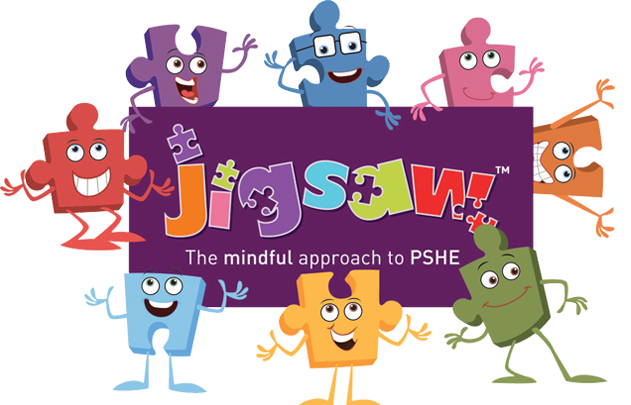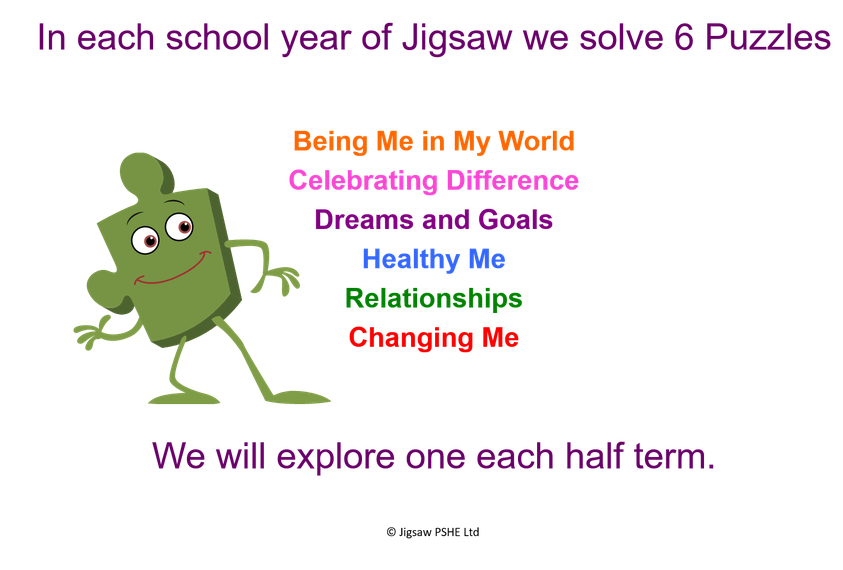Please also see our Intent-Implementation-Impact statement for Reading and all subjects which can be found under the Curriculum tab in 'Curriculum Statements'.
PSHE – Jigsaw

What is PSHE Education?
PSHE Education (Personal, Social, Health and Economic Education) is a planned programme of learning through which children and young people acquire the knowledge, understanding and skills they need to successfully manage their lives – now and in the future. As part of a whole-school approach, PSHE Education develops the qualities and attributes pupils need to thrive as individuals, family members and members of society.
What do schools have to teach in PSHE Education?
According to the National Curriculum, every school needs to have a broad and balanced curriculum that:
• promotes the spiritual, moral, social, cultural, mental and physical development of pupils at the school;
• prepares pupils at the school for the opportunities, responsibilities and experiences of later life;
• promotes British values.
From September 2020, primary schools in England have also needed to teach Relationships and Health Education as compulsory subjects and the Department for Education strongly recommends this should include age-appropriate Sex Education. Schools also have statutory responsibilities to safeguard their pupils (Keeping Children Safe in Education, DfE, 2019) and to uphold the Equality Act (2010).
At Hayfield Cross CofE Primary School, we follow a whole school PSHE scheme called Jigsaw. Jigsaw supports all of the above statements.
What is Jigsaw, the mindful approach to PSHE, and how does it work?
Jigsaw is a whole-school approach and embodies a positive philosophy and creative teaching and learning activities to nurture children’s development as compassionate and well-rounded human beings as well as building their capacity to learn.
Jigsaw is a comprehensive and completely original PSHE Education programme (lesson plans and teaching resources) for the whole primary school from ages 3-11 (12 in Scotland). Written by teachers and grounded in sound psychology, it also includes all the statutory requirements for Relationships and Health Education, and Sex Education is also included in the Changing Me Puzzle (unit).
Jigsaw has two main aims for all children:
• To build their capacity for learning
• To equip them for life
Jigsaw brings together PSHE Education, compulsory Relationships and Health Education, emotional literacy, mindfulness, social skills and spiritual development. It is designed as a whole school approach, with all year groups working on the same theme (Puzzle) at the same time at their own level. There are six Puzzles (half-term units of work) and each year group is taught one lesson per week. All lessons are delivered in an age- and stage-appropriate way so that they meet children’s needs.
Each Puzzle starts with an introductory assembly, generating a whole school focus for adults and children alike. There is also a Weekly Celebration that highlights a theme from that week’s lesson across the school encouraging children to live that learning in their behaviour and attitudes.
To find out more about Jigsaw please click on the link below to access a Parent/Carer information guide and our PSHE Policy.
By providing you with the curriculum coverage and the key vocabulary that we use in each year group, you as parents will develop an awareness of what children are expected to understand at what age. This will help you to be able to speak openly at home about these topics, which is a starting point for safeguarding and improving mental health.
See how Jigsaw fully incorporates the teaching of Fundamental British Values
UK British Values in Jigsaw- By puzzle and year group
See how Jigsaw lessons create opportunities for developing in Spiritual, Moral, Social and Cultural Development.
SMSC and Emotional Literacy Mapping Document in Jigsaw
Jigsaw is monitored and reviewed regularly by the staff and governing body. All teaching takes place in a safe learning environment and is underpinned by our school ethos and values.
Relationships, Sex and Health Education
From September 2020, Relationships and Health Education are compulsory in all primary schools in England. For primary aged children this includes curriculum content under two headings:
Relationships Education:
Relationships Education is designed to help children to have positive and safe relationships with family, friends and online. All primary schools are required by the government to teach Relationships Education and parents cannot withdraw children from this section of the curriculum. The areas this section of the curriculum cover are:
- Families and people who care for me
- Caring Friendships
- Respectful Relationships
- Online Relationships
- Being Safe
Health Education:
Health Education will help children to make good decisions about their health and wellbeing and enable them to know how to seek support if any health issues arise for themselves or others. The areas it will cover are:
- Mental wellbeing
- Internet safety and harms
- Physical health and fitness
- Healthy eating
- Drugs, alcohol and tobacco
- Health and prevention
- Basic first aid
- The changing adolescent body
This DfE guidance clearly states the statutory requirements, i.e. what children MUST be taught by the end of primary school. Health Education includes learning about ‘the changing adolescent body’ to equip children to understand and cope with puberty. The National Curriculum for Science (also a compulsory subject), includes learning the correct names for the main external body parts, learning about the human body as it grows from birth to old age and reproduction in some plants and animals (which could include human beings). So, Relationships Education, Health Education and Science are compulsory subjects and parents/carers do NOT have the right to withdraw their children from these subjects.
Sex Education
Sex Education is designed to help children to:
- Understand and respect their bodies
• Develop positive and healthy relationships appropriate to their age and development
• Support children to have positive self-esteem and body image
• Empower them to be safe and safeguarded.
Parents do have the right to request their child is withdrawn from these specific lessons. If you wish to withdraw your child, please contact the PSHE lead via
At Hayfield Cross, we have been delivering RSE within our Personal, Social, Health and Economic (PSHE) curriculum for many years. We have reviewed our PSHE curriculum to make sure that our lessons meet the requirements that the government has set out for the content of Relationships and Health Education. The DfE recommends, ‘that all primary schools should have a Sex Education programme tailored to the age and the physical and emotional maturity of the pupils.’ At Hayfield Cross this is taught through our Jigsaw PSHE programme, which is delivered through the ‘Relationships’ and ‘Changing Me’ puzzle pieces which are covered in the summer term.
There are four main aims of teaching RSE:
Each year group will be taught appropriate to their age and developmental stage. At no point will a child be taught something that is inappropriate; and if a question from a child arises and the teacher feels it would be inappropriate to answer, (for example, because of its mature or explicit nature), this information with be shared with you by your child’s class teacher. The question will not be answered to the child or class if it is outside the remit of that year group’s programme.
Below is a summary of RSE coverage within the Jigsaw scheme for each year group:
• Foundation Stage – Growing up: how we have changed since we were babies
• Year 1 – Boys’ and girls’ bodies; naming body parts
• Year 2 – Boys’ and girls’ bodies; body parts and respecting privacy (which parts of the body are private and why this is)
• Year 3 – How babies grow and how boys’ and girls’ bodies change as they grow older
• Year 4 – Internal and external reproductive body parts, body changes in girls and menstruation
• Year 5 – Puberty for boys and girls, and conception
• Year 6 – Puberty for boys and girls and understanding conception to birth of a baby
If you would like more information about statutory Relationships and Health Education, please click below to read a parent and carer guide. Further information about how the school approaches the teaching of Relationships and Sex Education through the Jigsaw programme can also be found within the documents listed below:
RSE – A Guide for Parents and Carers
Including and valuing ALL children. What does Jigsaw teach about LGBT+ relationships?
PSHE Files

